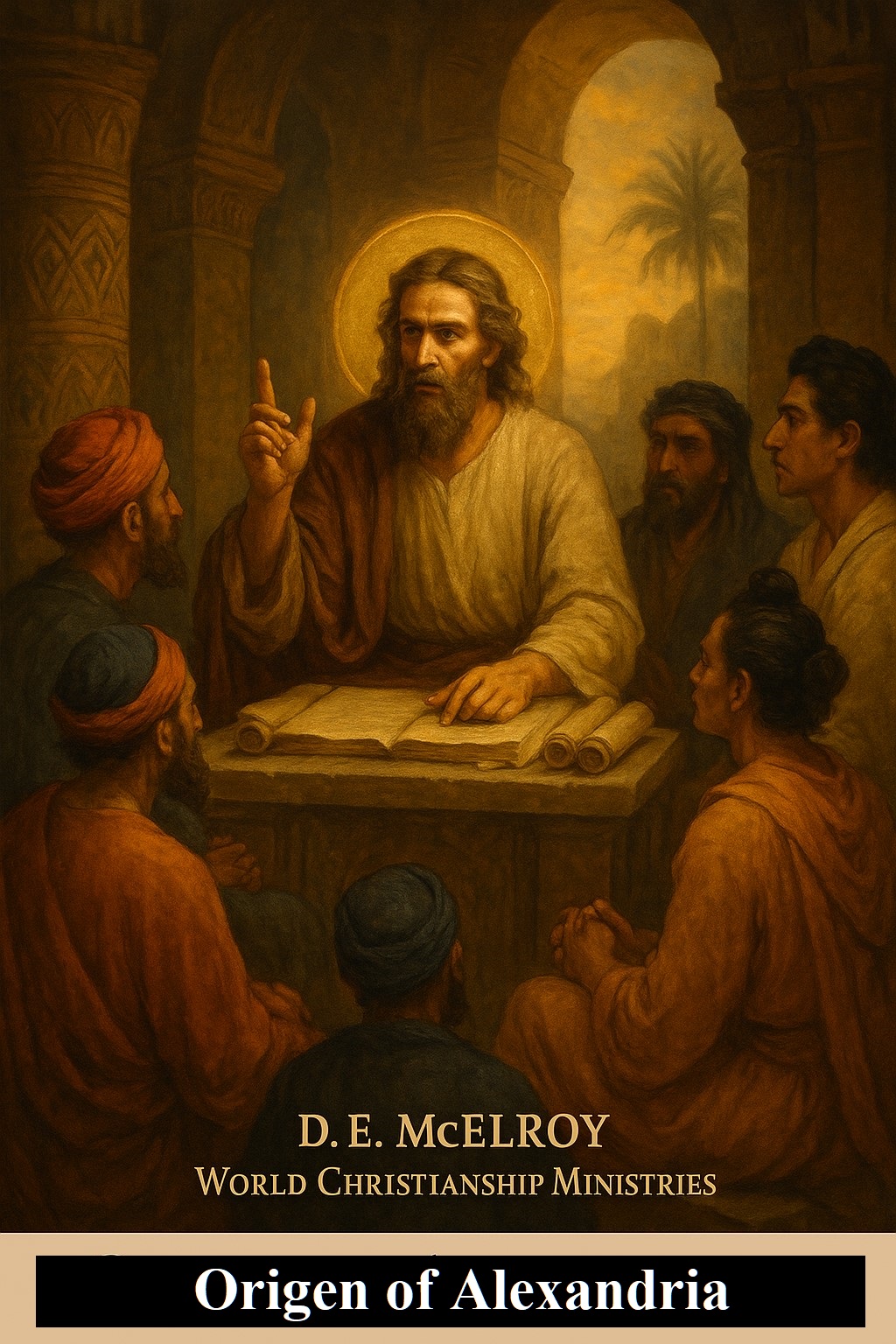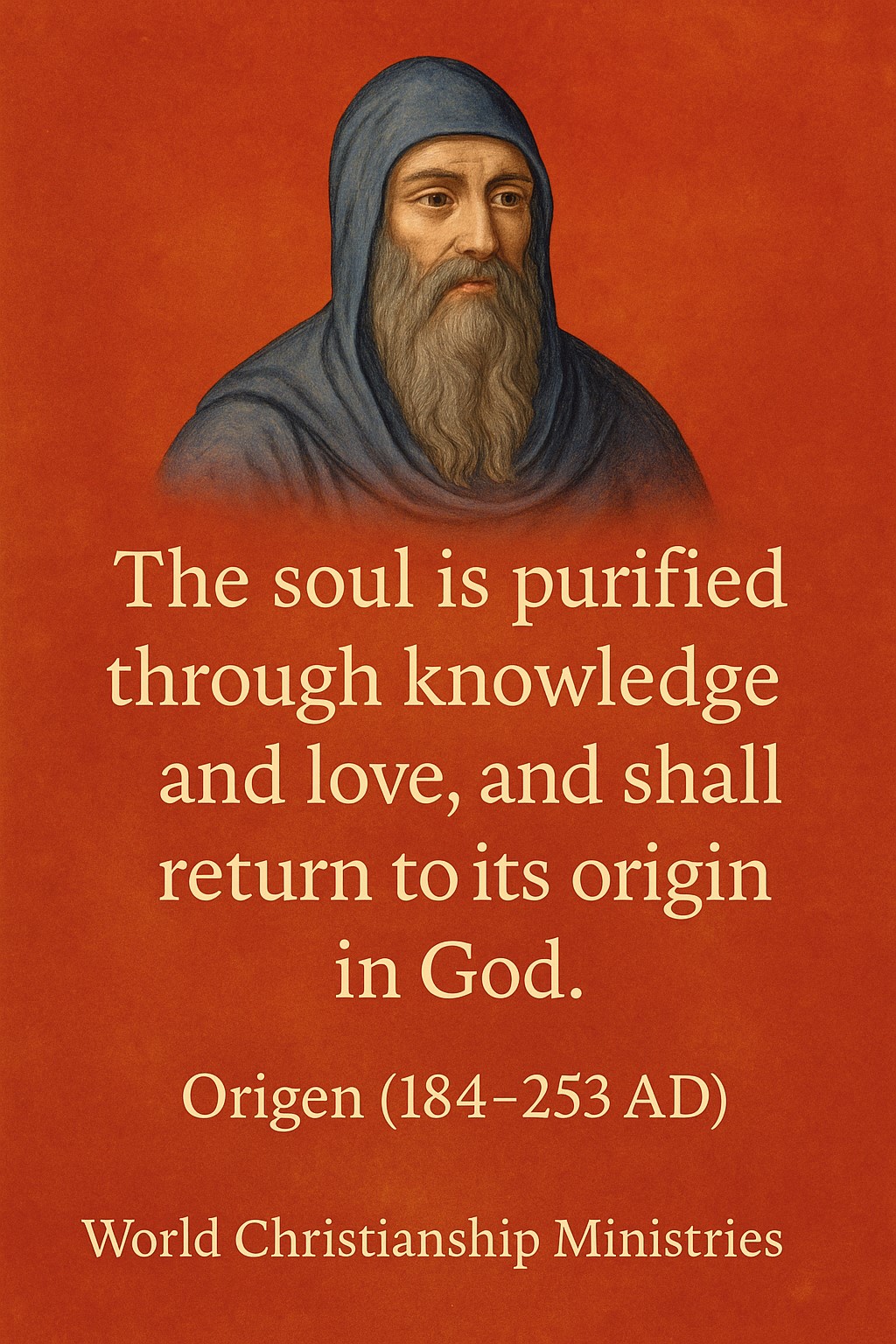Book Title:
Origen of Alexandria: The Mystic Mind Behind Early Christianity
Written by D.E. McElroy
Published by World Christianship Ministries
© 2025 All rights reserved
www.wcm.org
Author Bio & Copyright
D.E. McElroy is a lifelong seeker of spiritual truth and a passionate advocate for historical honesty. As founder of World Christianship Ministries, he is committed to a Jesus-centered approach that prioritizes love, truth, and compassion over institutional control. His work blends research, spiritual insight, and storytelling to bring forward forgotten voices and buried truths. McElroy's writings aim to restore dignity to those whom history tried to erase.
© 2025 D.E. McElroy / World Christianship Ministries. All rights reserved. This work may be shared freely for personal or educational use. Reproduction for commercial purposes without written permission is prohibited. For access to this and other free books, visit www.wcm.org
Chapter One: The Soul of Alexandria
In the vibrant intellectual city of Alexandria, where the ancient world’s wisdom converged—Jewish, Greek, Egyptian, and early Christian—was born a soul unlike any other: Origen of Alexandria. Born around AD 184, Origen was raised in a devout Christian family during a time of persecution. His father, Leonidas, was executed for his faith, and this early trauma deeply shaped the boy’s spiritual hunger and fierce devotion.
By his early twenties, Origen was already a renowned teacher and head of the Catechetical School of Alexandria, a hub for spiritual and philosophical education. Here, he taught both pagans and Christians, developing a theology that would challenge, inspire, and eventually scandalize the early Church.
Chapter Two: The First Theologian
Origen was not content to recite doctrine—he sought to understand the soul’s place in the cosmos. His great work, On First Principles, was the first systematic theology in Christian history. He taught that:
The soul existed before birth, descending into matter due to forgetfulness or error.
All beings—including Satan—would eventually return to God (universal reconciliation).
Scripture had layers: literal, moral, and spiritual/allegorical.
These views were daring, even dangerous. And yet, they reflected an early Christian yearning for truth that transcended dogma.
Chapter Three: A Gnostic Without a Label?
While Origen debated the Gnostics of his time, he was not far from their essence:
He sought inner knowledge (gnosis).
Believed in soul progression and purification.
Viewed material reality as a stage—not a prison.
Yet he rejected the pessimism of many Gnostics. For Origen, creation was not a mistake, but a classroom. The fall of the soul was not eternal damnation, but an invitation to rise.
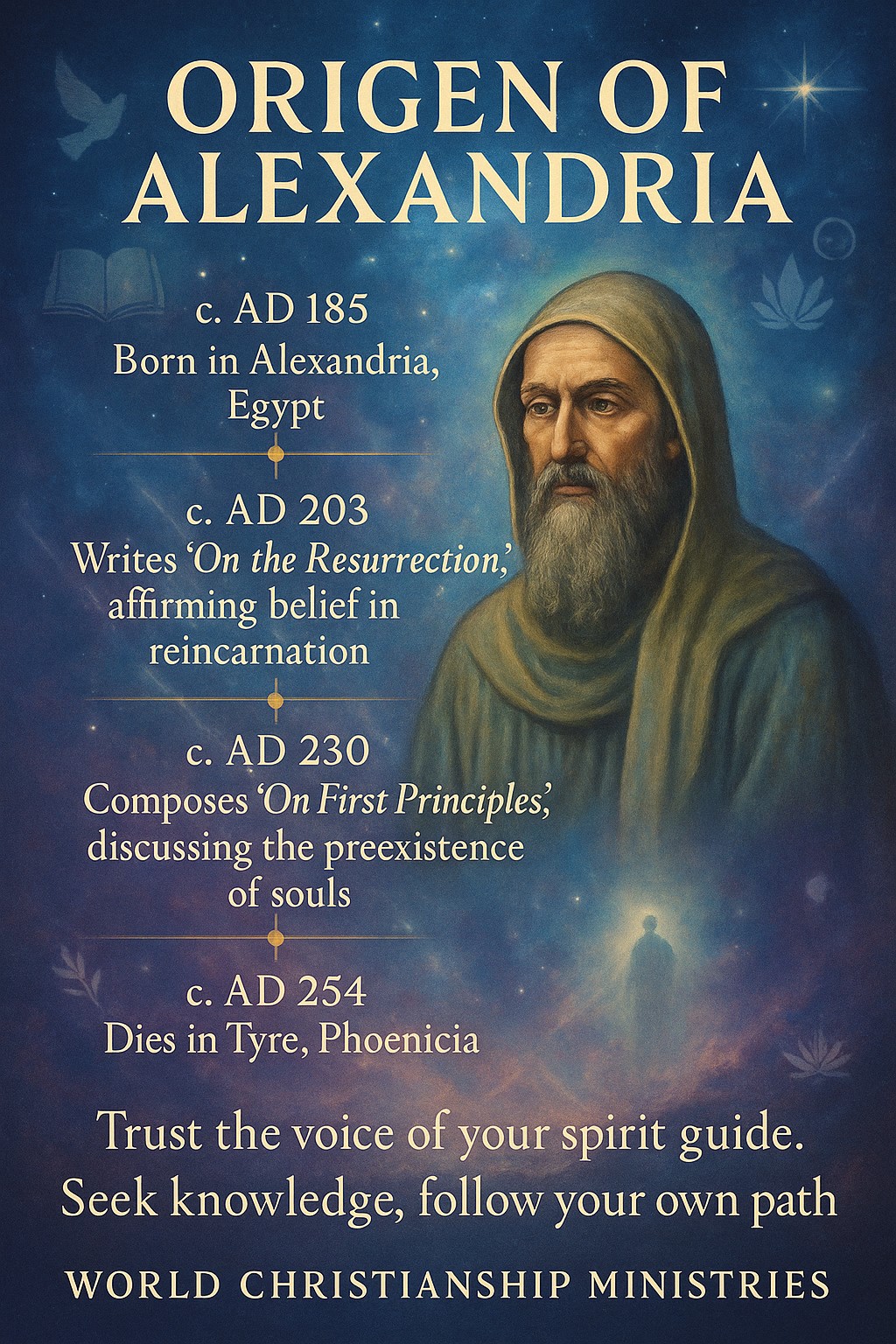
Chapter Four: Clashing with the Church
As centuries passed, Origen’s teachings became too radical for a Church moving toward institutional control. In AD 553, long after his death, the Second Council of Constantinople condemned many of his ideas.
Why?
Universal salvation threatened the need for priests and sacraments.
Pre-existence of souls undermined original sin.
Mystical interpretation of scripture bypassed Church authority.
And yet, these very teachings would inspire mystics, monks, and spiritual seekers for centurie
Chapter Five: Legacy of a Mystic Mind
Origen’s spirit lives on—not in the rigid structures of creeds, but in the quiet places of contemplation and deep study. He reminds us that early Christianity was not monolithic. It was a wild, beautiful search for truth.
His teachings whisper to modern seekers:
“You are more than you remember. You are older than your birth. You are destined to return.”
This is Origen—not a heretic, but a bridge between Christ and cosmos, spirit and scripture, memory and destiny.
Chapter Six: Origen’s Hidden Influence
Though condemned by Church councils, Origen’s thought endured in secret. Desert monks studied his writings by candlelight. Mystics of the Middle Ages echoed his allegories. His universalism found new voice in theologians like Gregory of Nyssa, and his cosmology echoed later in Eastern Orthodox theology.
Even today, those who search the soul’s deeper meaning stumble upon his trail: in texts, in silence, in dreams. Origen’s insistence that all souls are drawn back to divine light finds kinship with Near Death Experiences, Gnostic revelations, and even the spiritual intuitions of modern seekers.
He was not simply an early theologian—he was a man whose mind reached centuries ahead.
His lasting influence was not on the seat of Peter, but in the hearts of those unafraid to question.
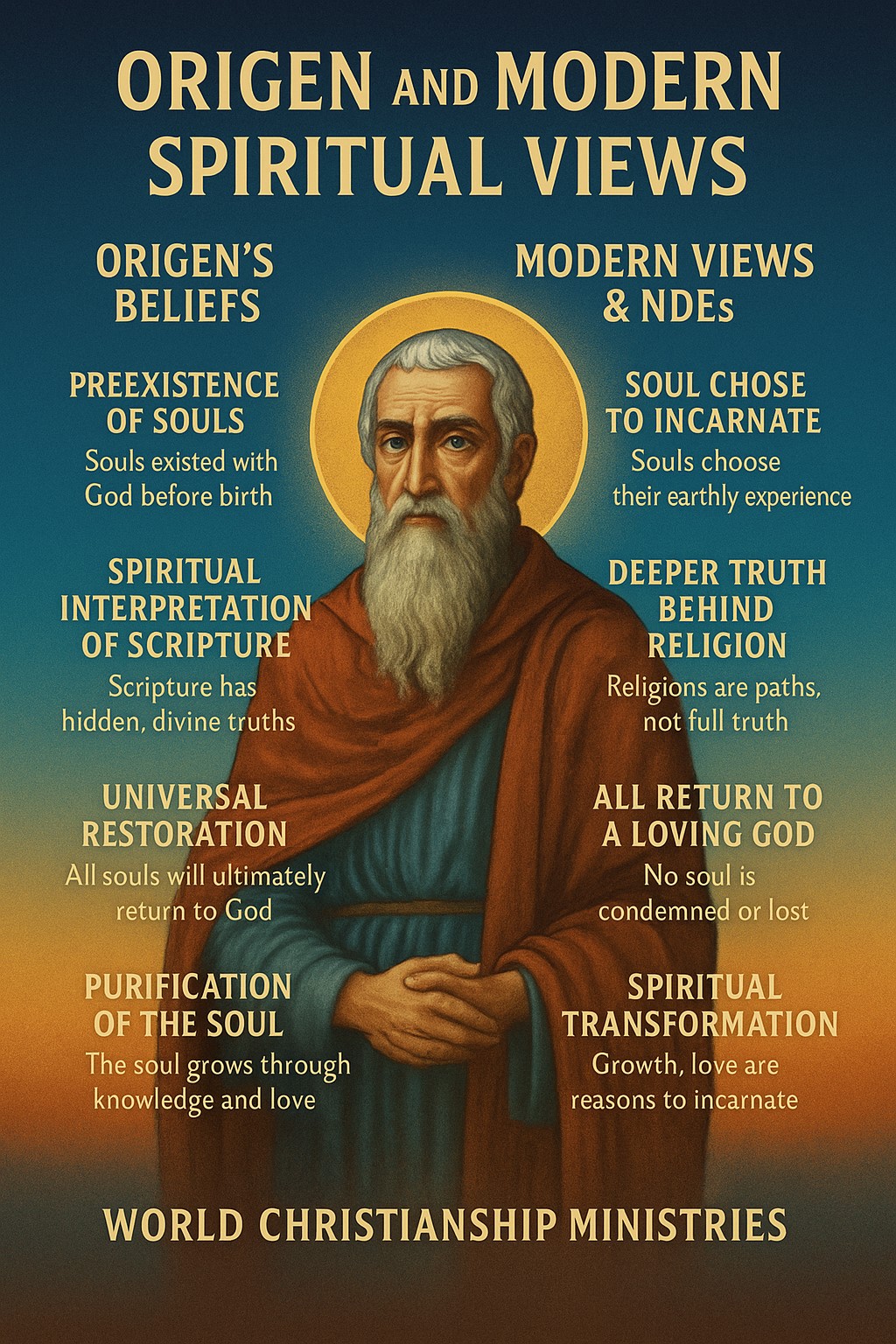
Chapter Seven: Origen and the Mystery of Salvation
For Origen, salvation was not a courtroom judgment, but a healing journey of the soul. He envisioned a universe where each soul would be purified over vast ages—through learning, incarnation, and divine correction—until finally reunited with God.
He asked not, “Are you saved?” but “Are you awakening?”
In his vision, even the fallen—those who strayed furthest—were not condemned eternally, but drawn slowly back through the fires of transformation. Hell, he believed, was not eternal punishment but a purging—a necessary phase in the return to wholeness.
This understanding of salvation as restoration rather than damnation sparked fierce resistance from institutional religion. Yet it offered a profound hope: that divine justice is inseparable from divine mercy.
In this cosmic view, the soul’s destiny is not determined in a moment of belief or baptism, but unfolds across lifetimes. Love, not fear, is the force guiding the journey home.
Chapter Eight: The Man Behind the Teachings
Origen’s life was not just defined by ideas—it was shaped by extraordinary personal discipline and deep devotion. He practiced spiritual asceticism, choosing a life of celibacy, poverty, and fasting, believing these purified the soul and sharpened spiritual clarity.
He wrote tirelessly—over 6,000 works, according to ancient sources—including commentaries, sermons, letters, and theological treatises. Though much has been lost, what survives reveals a man devoted not to fame, but to truth.
Origen saw himself as a servant of divine wisdom. He did not seek to found a sect or claim authority. Instead, he urged others to go deeper, to move beyond ritual and toward personal transformation.
Even when arrested and imprisoned during the persecution under Emperor Decius, Origen remained faithful. Tortured and weakened, he eventually died from his wounds. But he left behind something no empire could silence: a vision of a loving, intelligent, evolving universe, where every soul mattered.
Origen lived as he taught—with courage, humility, and the unshakable belief that the journey of the soul is eternal.
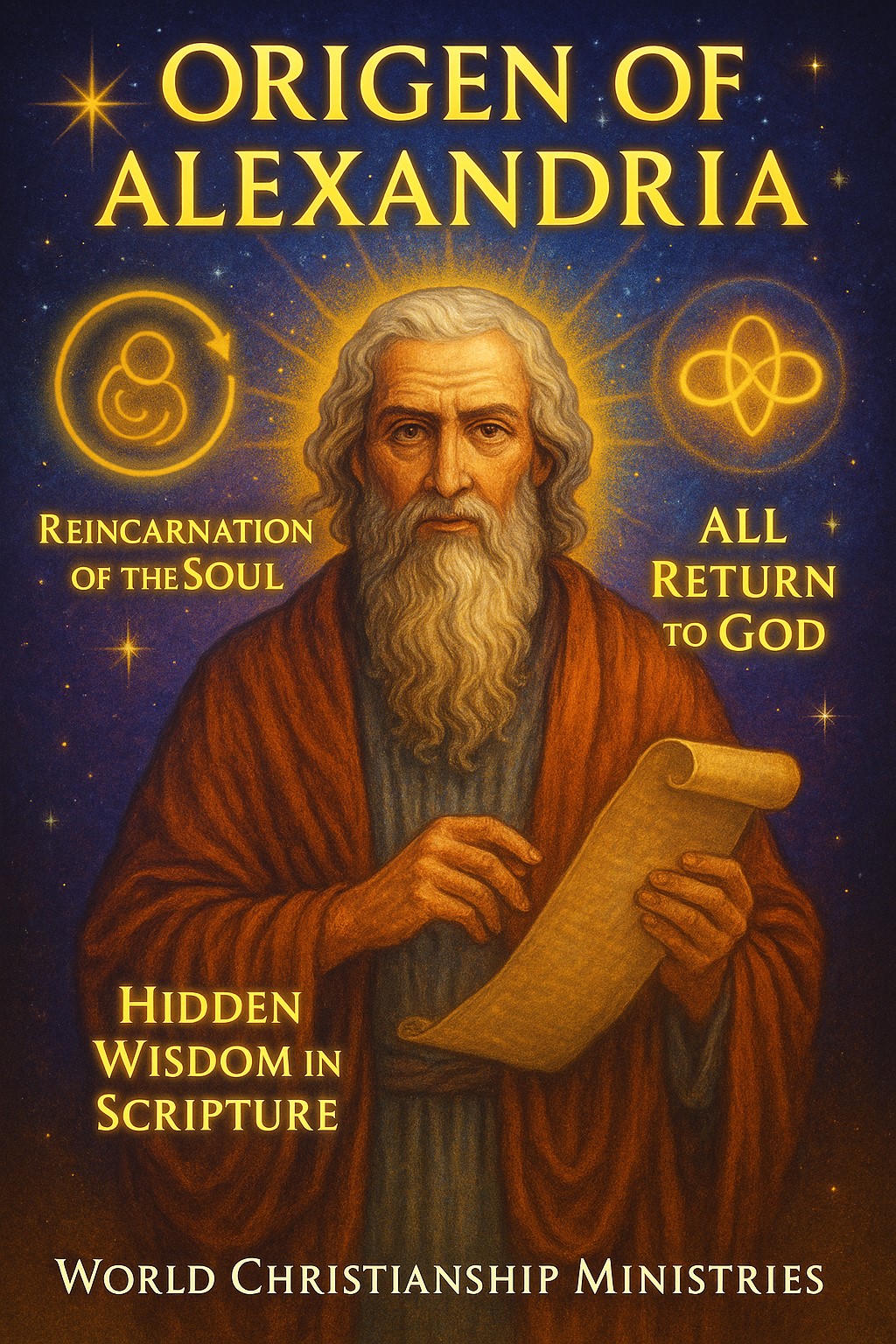
Chapter Nine: Reclaiming Origen Today
In an age where spiritual seekers crave authenticity, Origen’s voice calls across the centuries: think deeply, love widely, and trust the eternal journey of the soul. He is not just a figure of the past—he is a guide for the future.
Modern theology, mysticism, and even science are revisiting ideas he intuited long ago:
That consciousness may precede biology.
That the soul undergoes vast evolutionary processes.
That all paths, however broken, lead home.
His story reminds us that truth can be exiled—but not extinguished. Though condemned, misquoted, and forgotten by the institution that once shaped him, Origen’s thought survives where it always lived best—in the hearts of the awakened.
Reclaiming Origen means returning to a Christianity unafraid of questions, unbound by fear, and open to the vastness of divine mystery. His was a gospel not of condemnation, but of restoration. Not of rigid creed, but living wisdom.
And perhaps now, at this crossroads in spiritual history, the world is finally ready to listen.
Conclusion: A Voice Through Time
Origen of Alexandria was not merely a man of his age—he was a whisper from the eternal, speaking into the hearts of future seekers. His voice did not fade with the councils that silenced him, nor with the centuries that buried his books. It lives in the longing for deeper meaning, for a God who loves without end, for a soul’s journey that never stops unfolding.
If the Church had embraced Origen, the trajectory of Christianity might have leaned toward compassion over control, transformation over conformity. But even in exile, his ideas seeded a quieter revolution—one that now rises in the minds of mystics, the hearts of healers, and the awakenings of everyday souls.
His gift was not certainty, but the courage to explore. His faith was not in dogma, but in divine love.
May we carry his torch, not as keepers of doctrine, but as seekers of truth.
Visual Appendix
🔹 Timeline of Origen’s Life
AD 184: Born in Alexandria
AD 202: Father martyred; persecution under Septimius Severus
AD 215: Begins teaching at the Catechetical School of Alexandria
AD 230: Ordained as a priest in Caesarea
AD 250: Imprisoned and tortured under Emperor Decius
AD 253: Dies from injuries sustained in prison
🔹 Key Teachings Summary
| Concept | Origen's View | Orthodox Church View (Historic) |
|---|---|---|
| Pre-existence of souls | Yes – souls existed before embodiment | No – souls are created at conception |
| Universal salvation | Yes – even Satan will ultimately be redeemed | No – eternal hell for the unrepentant |
| Nature of scripture | Multi-layered: literal, moral, spiritual | Literal/moral prioritized |
| Jesus as Logos | Eternal divine reason incarnate in Jesus | Affirmed but limited to dogma |
| Hell and punishment | Temporary purification, not eternal damnation | Hell is eternal for some |
| Gnosis (spiritual insight) | Encouraged through allegorical interpretation | Often discouraged or viewed with suspicion |
🔹 Notable Quotes from Origen
“The soul that has once beheld God, and been taught by Him, and become His disciple, cannot perish.”
“God the Word is the physician of souls, curing each according to its condition.”
“All things are being restored to their proper place, through the mercy of God.”
🔹 Visual Map: Origen’s Influence
Alexandria – birthplace and education
Caesarea – teaching and priesthood
Rome & Constantinople – eventual condemnation
Desert monasticism – secret legacy preserved
Modern mystics & theologians – spiritual rebirth of Origen’s ideas
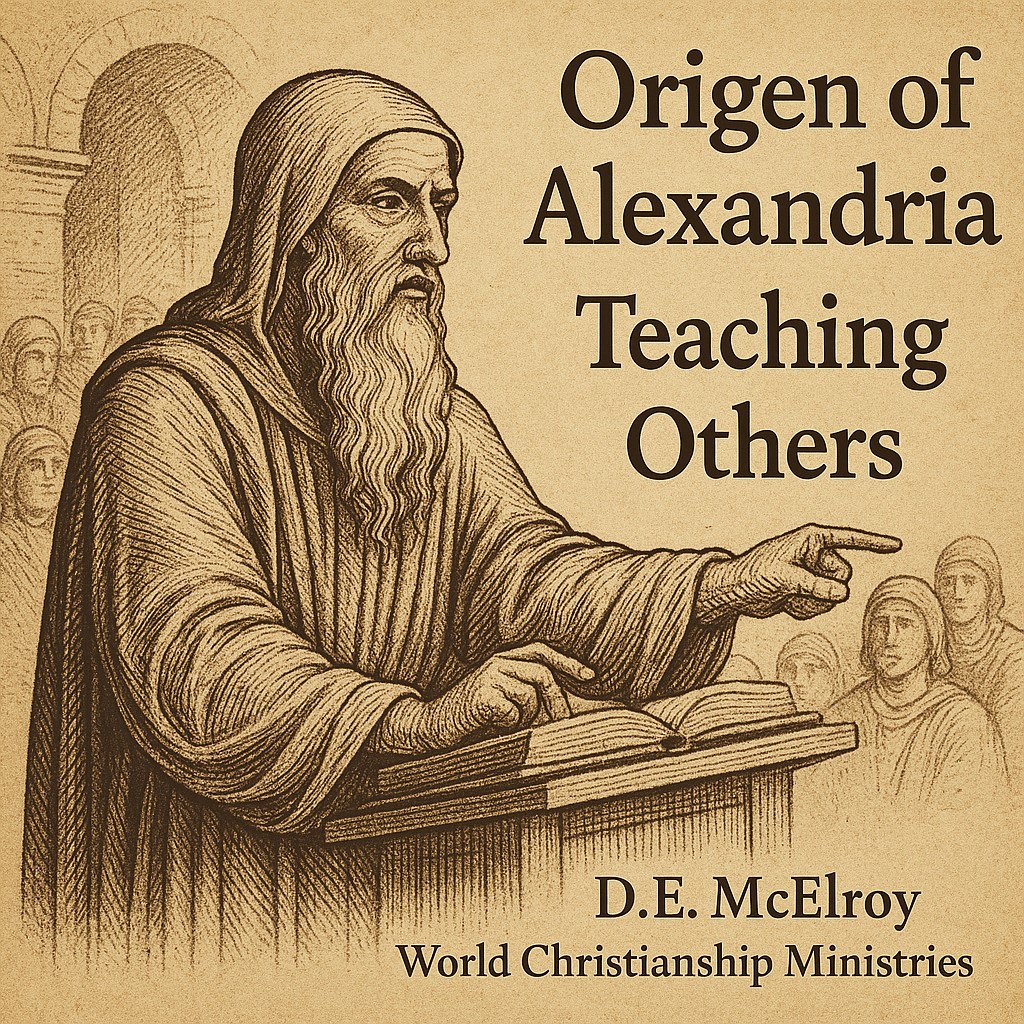
🔹 Allegorical vs. Literal Interpretation (Illustrated Summary)
Literalist View:
Scripture = historical record and legal code
Faith = obedience and ritual
Origen’s View:
Scripture = multi-layered spiritual revelation
Faith = personal transformation and soul awakening
“The letter kills, but the Spirit gives life.” – Origen’s motto for understanding scripture
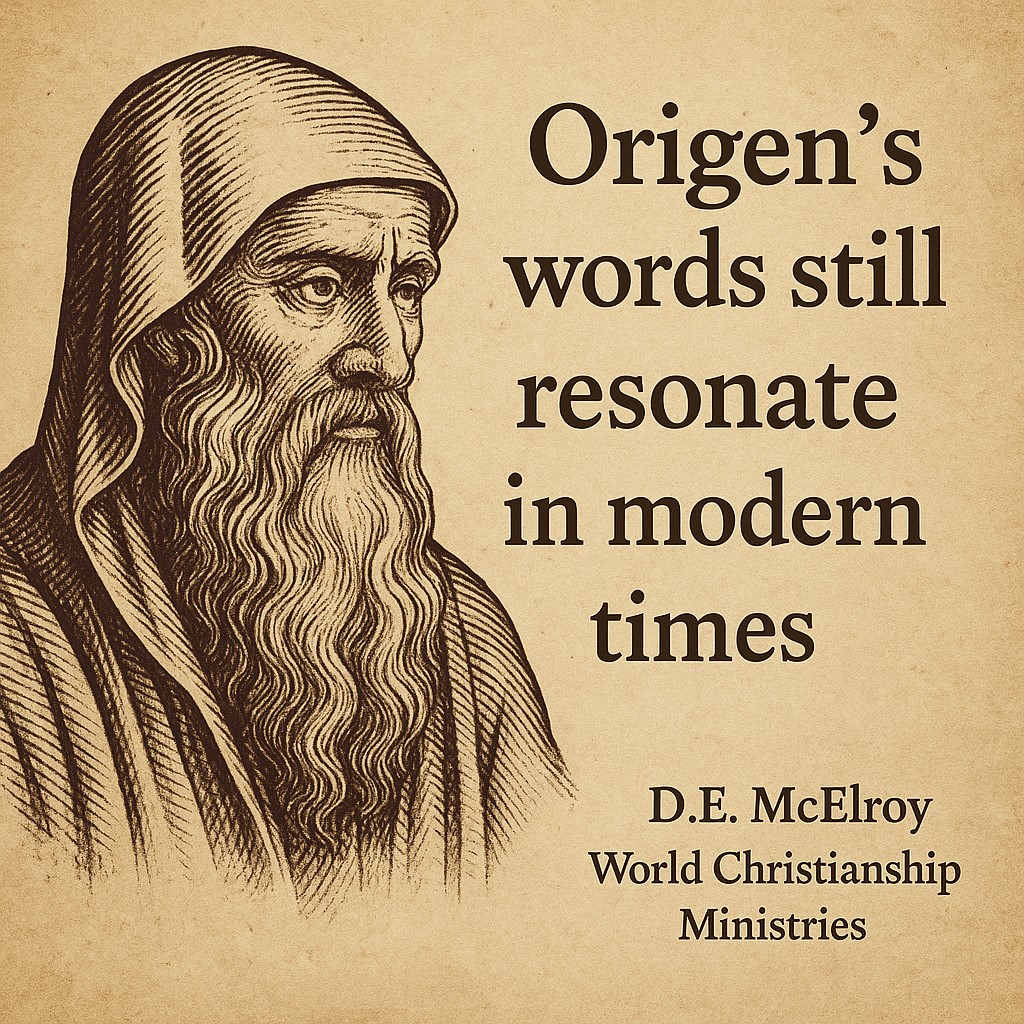 Origen of Alexandria is indeed a major figure in early Christian thought, and while not a Gnostic himself, his work overlaps with many spiritual and philosophical themes found in Gnostic literature. Here's a comprehensive overview of Origen, with a focus on areas that might interest your research: 🧠 Origen of Alexandria (c. 185 – c. 254 AD)🏛 Background and Life
📚 Key Works (Surviving and Fragmentary)
✨ Theological and Spiritual Themes🔁 Preexistence of SoulsOrigen taught that souls existed before birth and were created by God in a spiritual realm—very similar to Gnostic cosmology. Souls "fell" from unity with God into material existence by choice.
🔥 Spiritual Interpretation of ScriptureOrigen emphasized allegorical and mystical readings of the Bible—insisting that literal interpretation was spiritually immature. This aligns with the Gnostic belief that truth is hidden beneath surface texts. ⚖️ Universal Restoration (Apokatastasis)He believed that eventually all souls—even Satan—would be restored to God. This was later condemned as heresy but reflects a radically loving and inclusive vision, like that seen in many NDEs. 💎 Knowledge (Gnosis) of GodAlthough Origen opposed heretical Gnostics like Valentinus and Basilides, he shared the idea that true knowledge of God (Gnosis) was the ultimate spiritual goal—not blind faith or fear-based obedience. ⚔️ Relationship to Gnosticism
🛑 Later Condemnation and Legacy
💡 Why He Matters to YouGiven your interest in:
Origen’s teachings resonate deeply—especially in his belief that all souls return to God, that scripture holds hidden truths, and that true religion is spiritual transformation, not dogma |
| WCM Home Page WCM International Music Page Sins Page Animal Lovers Page Our Earth Today Page NDE-Near Death Experience Page Human Interest Page Homeless in the USA Page Fast Jesus Centered Christian Ordination |
